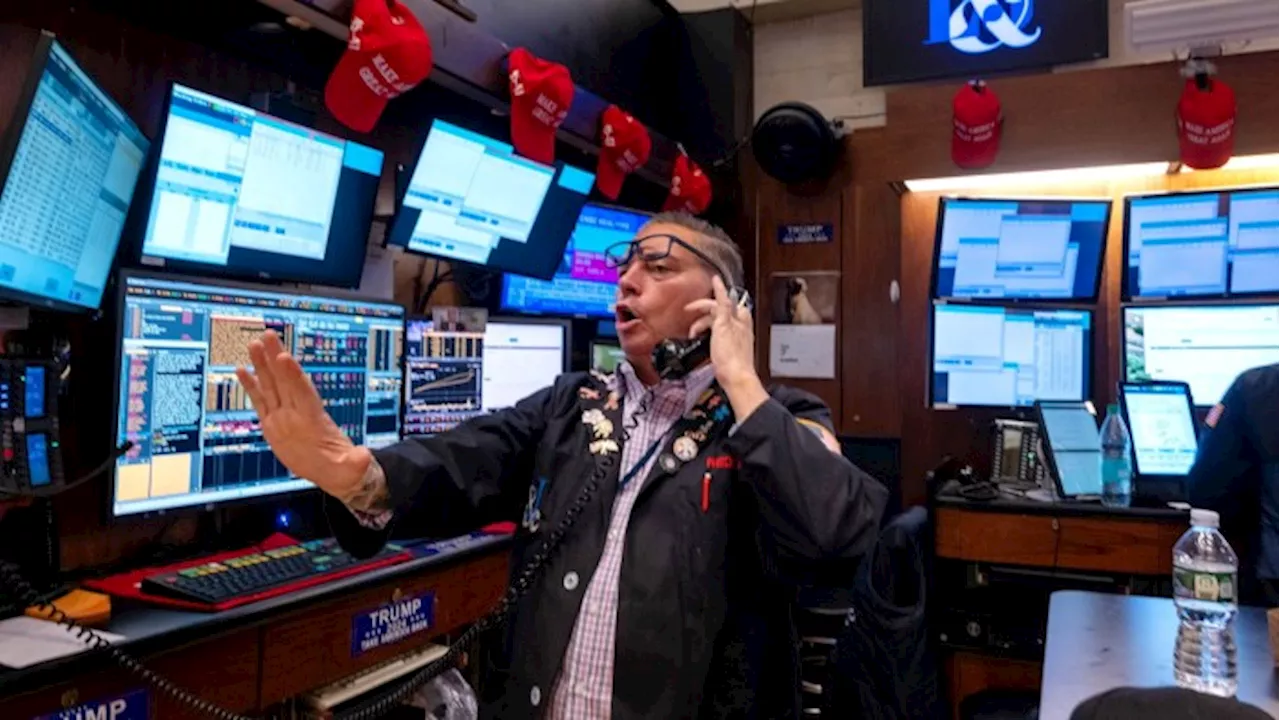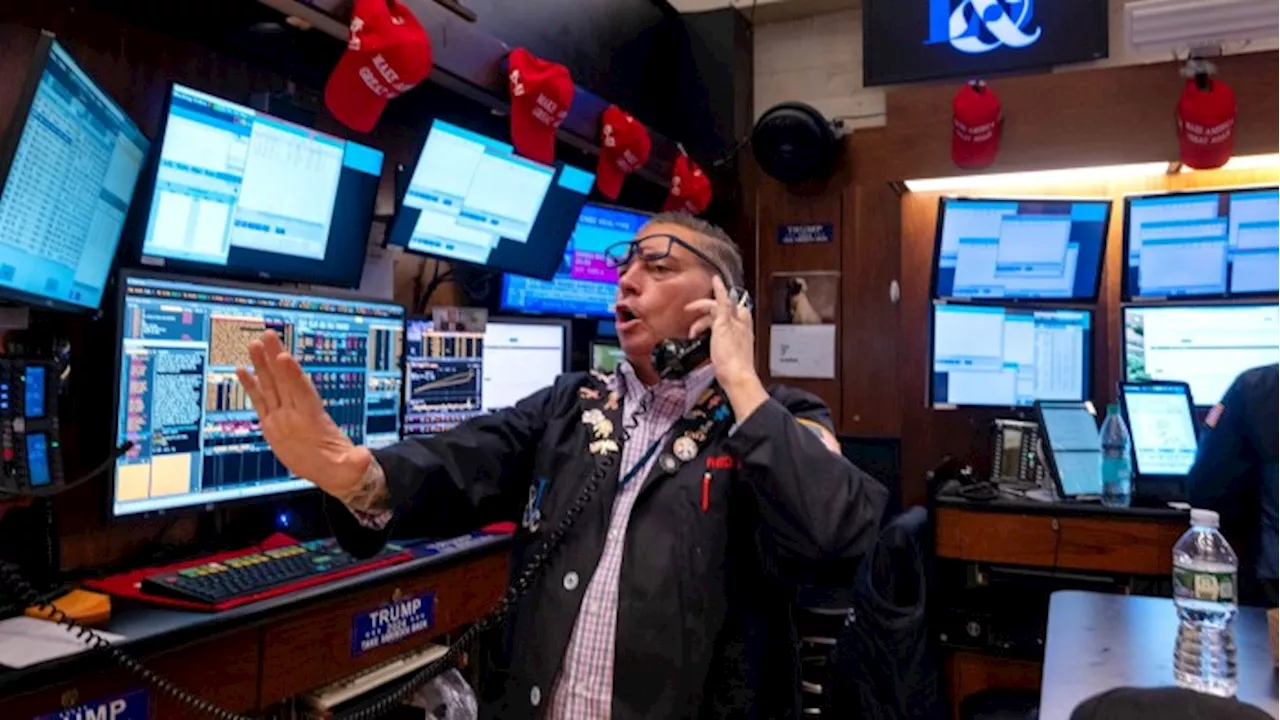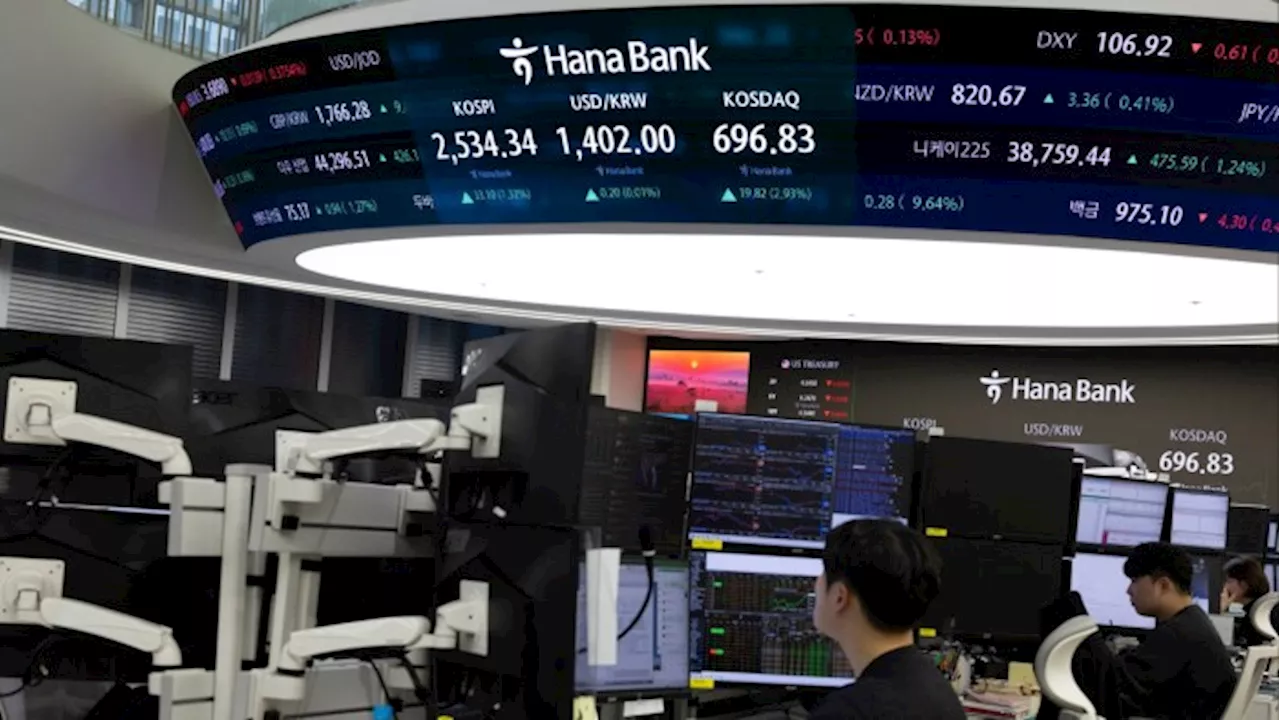Asian stock markets experienced declines on Monday, driven by investor adjustments to expectations for prolonged high interest rates following robust US economic data.
Asian stocks experienced losses on Monday as investors adjusted their outlooks for prolonged high interest rates. This shift followed robust US economic data released last week. Equities in Australia, Hong Kong, mainland China, India, and South Korea all declined on Monday morning. The US payrolls report on Friday indicated a substantial addition of 256,000 jobs in December, surpassing expectations and prompting traders to reduce anticipations for rate cuts by the Federal Reserve.
The dollar index, which measures its value against the yen, pound, and other major currencies, reached a two-year high on Friday. A stronger US economy could potentially impede the Fed's pace of interest rate reductions, thereby diverting investment away from other markets, including Asia. 'People are taken aback by the economic strength in the US,' stated Jason Lui, head of Asia-Pacific equity and derivative strategy at BNP Paribas. 'With US interest rates so elevated, we'll witness a liquidity drain in Asia, as capital flows to the US or remains there.' Australia's S&P/ASX 200 index fell 1.3 percent, while South Korea's Kospi declined 1.1 percent. India's Sensex index dropped 0.8 percent. The Japanese market was closed on Monday. 'Emerging market equities generally perform better when US interest rates are lower,' said Sunil Tirumalai, head of Asian equity strategy at UBS. 'In fact, they are more susceptible to US rates than US equities themselves.' Hong Kong's Hang Seng retreated 1.4 percent, while mainland China's CSI 300 declined 0.5 percent. 'The onshore market remains relatively resilient in comparison to external noise,' said Lui, noting that mainland investors are still transferring funds from low-yield savings accounts into the equity market. Nevertheless, mainland Chinese equities have gradually decreased by 17 percent since reaching a peak on October 8 last year, as hopes for a substantial stimulus package from Beijing waned and concerns regarding the economic impact of Donald Trump's second term emerged in the market. 'Some stimulus measures have been a welcome surprise,' acknowledged Tirumalai, who recognized that China was still in a 'bear market.' 'The extension of the trade-in scheme to a broader range of consumer goods, for instance, arrived sooner than anticipated.' Oil prices surged to a four-month high after the US implemented sweeping new sanctions on Russian oil on Friday. Prices for Brent crude, the international benchmark, climbed 1.6 percent to $81 a barrel, while the US gauge West Texas Intermediate gained 1.7 percent to $77.90 a barrel
ASIAN STOCKS INTEREST RATES US ECONOMY INVESTOR SENTIMENT EMERGING MARKETS
United Kingdom Latest News, United Kingdom Headlines
Similar News:You can also read news stories similar to this one that we have collected from other news sources.
 US Stocks Fall for Second Day as Investors Lock in ProfitsUS stocks declined for the second consecutive trading day as investors took profits after a strong year for equity markets. The S&P 500 and Nasdaq Composite both experienced losses, with a broad sell-off impacting nearly all sectors. Boeing, US airlines, and major tech companies including Tesla, Oracle, and Dell were among the biggest decliners. Analysts attributed the pullback to profit-taking and concerns over sustained higher interest rates.
US Stocks Fall for Second Day as Investors Lock in ProfitsUS stocks declined for the second consecutive trading day as investors took profits after a strong year for equity markets. The S&P 500 and Nasdaq Composite both experienced losses, with a broad sell-off impacting nearly all sectors. Boeing, US airlines, and major tech companies including Tesla, Oracle, and Dell were among the biggest decliners. Analysts attributed the pullback to profit-taking and concerns over sustained higher interest rates.
Read more »
 US Tech Stocks Slip as Investors Reassess AI BetsUS tech stocks experienced a decline on Friday as investors shifted away from companies that had driven market gains throughout the year. The S&P 500 and Nasdaq Composite both fell, with Tesla and Nvidia among the biggest losers. This widespread selling followed a strong rally in tech stocks fueled by optimism over artificial intelligence and favorable policies. However, recent weeks have seen increased volatility as investors reassess holdings and the Federal Reserve's hawkish stance on interest rates has dampened the appeal of growth stocks.
US Tech Stocks Slip as Investors Reassess AI BetsUS tech stocks experienced a decline on Friday as investors shifted away from companies that had driven market gains throughout the year. The S&P 500 and Nasdaq Composite both fell, with Tesla and Nvidia among the biggest losers. This widespread selling followed a strong rally in tech stocks fueled by optimism over artificial intelligence and favorable policies. However, recent weeks have seen increased volatility as investors reassess holdings and the Federal Reserve's hawkish stance on interest rates has dampened the appeal of growth stocks.
Read more »
 US Tech Stocks Slip as Investors Rotate Away from GrowthUS tech stocks declined on Friday, marking a shift away from companies that have driven market gains this year. The S&P 500 and Nasdaq Composite fell, with Tesla and Nvidia among the biggest losers. Investors are reassessing holdings and adjusting to the Federal Reserve's hawkish stance on interest rates, which has increased borrowing costs and impacted the appeal of high-growth companies.
US Tech Stocks Slip as Investors Rotate Away from GrowthUS tech stocks declined on Friday, marking a shift away from companies that have driven market gains this year. The S&P 500 and Nasdaq Composite fell, with Tesla and Nvidia among the biggest losers. Investors are reassessing holdings and adjusting to the Federal Reserve's hawkish stance on interest rates, which has increased borrowing costs and impacted the appeal of high-growth companies.
Read more »
 US Stocks Drop as Investors Take ProfitsUS stocks experienced a sharp decline for the second consecutive trading day, fueled by profit-taking and concerns about the Federal Reserve's monetary policy.
US Stocks Drop as Investors Take ProfitsUS stocks experienced a sharp decline for the second consecutive trading day, fueled by profit-taking and concerns about the Federal Reserve's monetary policy.
Read more »
 South Korean Retail Investors Favor US Stocks Amid Local Market SlumpFrustrated by years of poor performance in the South Korean stock market, retail investors are increasingly turning to US equities, betting on a continued rally. This trend is driven by a desire for higher returns and dissatisfaction with the local market's volatility.
South Korean Retail Investors Favor US Stocks Amid Local Market SlumpFrustrated by years of poor performance in the South Korean stock market, retail investors are increasingly turning to US equities, betting on a continued rally. This trend is driven by a desire for higher returns and dissatisfaction with the local market's volatility.
Read more »
 China Stocks Tumble as Investors Brace for Trump's Return and Economic UncertaintyChinese equities and the renminbi experienced losses amid weak economic data and geopolitical anxieties surrounding Donald Trump's imminent inauguration. The CSI 300 index declined 0.2% and has plunged 4.1% in the first three trading days of 2025. Hong Kong's Hang Seng index also dropped 0.4% for the day. China's regulators, aiming to calm market jitters, met with international investors and the central bank reiterated its commitment to currency stability. The potential for increased tariffs on Chinese exports under Trump's presidency fueled investor concerns.
China Stocks Tumble as Investors Brace for Trump's Return and Economic UncertaintyChinese equities and the renminbi experienced losses amid weak economic data and geopolitical anxieties surrounding Donald Trump's imminent inauguration. The CSI 300 index declined 0.2% and has plunged 4.1% in the first three trading days of 2025. Hong Kong's Hang Seng index also dropped 0.4% for the day. China's regulators, aiming to calm market jitters, met with international investors and the central bank reiterated its commitment to currency stability. The potential for increased tariffs on Chinese exports under Trump's presidency fueled investor concerns.
Read more »
